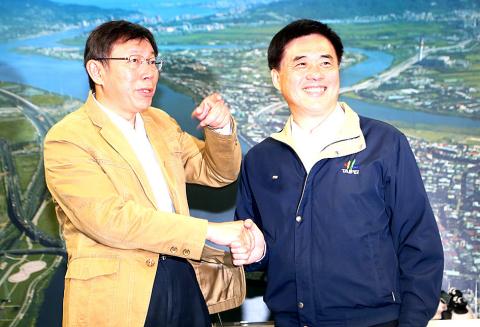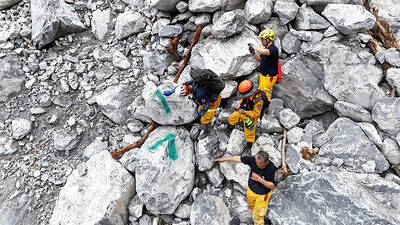Policy continuity was the main focus yesterday as Taipei mayor-elect Ko Wen-je (柯文哲) held his first official meeting with Taipei Mayor Hau Lung-bin (郝龍斌) of the Chinese Nationalist Party (KMT).
Ko, who ran as an independent in the pro-KMT stronghold of Taipei, won more than 57 percent of the vote in the election on Saturday last week, defeating Sean Lien (連勝文) of the KMT.
Ko will assume the office on Dec. 25.

Photo: CNA
Hau yesterday was knocked over by jockeying cameramen in the blizzard of media attention which accompanied Ko’s initial entrance into the city hall’s mayoral suite.
Hau and Ko emerged after 40 minutes, announcing that Taipei Deputy Mayor Chen Yung-jen (陳永仁) and Ko’s deputy mayor-designate, Teng Chia-chi (鄧家基), would serve as the point men for the transition.
“Preserving policy continuity is one of our basic policies,” Ko said. “Good policies will be continued and no personnel changes will be made below the level of deputy commissioner.”
Hau said he would provide Ko with relevant documentation and reasoning for any policy he requests. The city government has already drafted a set of 60 policies to include in the transition progress, he said.
Ko said that because he has not yet been able to look over the city governments’ internal documents, there was a possibility that there had been “misunderstandings” about some of the Hau administration’s policies, even in the case of the Taipei Twin Towers (雙子星) corruption case, for which Ko has promised to publicize all related meeting records.
In one adjustment of policy stance, Ko backed away from previous statements that he would remove a non-commissioned bus lane along Zhongxiao W Road soon after taking office, stating that the road might soon be needed in the city’s traffic plans.
Ko also came out in support of Taipei’s high-school admissions plan for next year, saying that it is too late to reopen the negotiations with New Taipei City required for any adjustments to the plan.
The plan has been a continuing source of tension between Taipei and the Ministry of Education, with the ministry refusing to accept the plan on Monday.
Meanwhile, at yesterday’s city government meeting, Hau also announced that there would be no major new policies or budget revisions until after the transition is completed.

Former president Ma Ying-jeou’s (馬英九) mention of Taiwan’s official name during a meeting with Chinese President Xi Jinping (習近平) on Wednesday was likely a deliberate political play, academics said. “As I see it, it was intentional,” National Chengchi University Graduate Institute of East Asian Studies professor Wang Hsin-hsien (王信賢) said of Ma’s initial use of the “Republic of China” (ROC) to refer to the wider concept of “the Chinese nation.” Ma quickly corrected himself, and his office later described his use of the two similar-sounding yet politically distinct terms as “purely a gaffe.” Given Ma was reading from a script, the supposed slipup

Former Czech Republic-based Taiwanese researcher Cheng Yu-chin (鄭宇欽) has been sentenced to seven years in prison on espionage-related charges, China’s Ministry of State Security announced yesterday. China said Cheng was a spy for Taiwan who “masqueraded as a professor” and that he was previously an assistant to former Cabinet secretary-general Cho Jung-tai (卓榮泰). President-elect William Lai (賴清德) on Wednesday last week announced Cho would be his premier when Lai is inaugurated next month. Today is China’s “National Security Education Day.” The Chinese ministry yesterday released a video online showing arrests over the past 10 years of people alleged to be

THE HAWAII FACTOR: While a 1965 opinion said an attack on Hawaii would not trigger Article 5, the text of the treaty suggests the state is covered, the report says NATO could be drawn into a conflict in the Taiwan Strait if Chinese forces attacked the US mainland or Hawaii, a NATO Defense College report published on Monday says. The report, written by James Lee, an assistant research fellow at Academia Sinica’s Institute of European and American Studies, states that under certain conditions a Taiwan contingency could trigger Article 5 of NATO, under which an attack against any member of the alliance is considered an attack against all members, necessitating a response. Article 6 of the North Atlantic Treaty specifies that an armed attack in the territory of any member in Europe,

The bodies of two individuals were recovered and three additional bodies were discovered on the Shakadang Trail (砂卡礑) in Taroko National Park, eight days after the devastating earthquake in Hualien County, search-and-rescue personnel said. The rescuers reported that they retrieved the bodies of a man and a girl, suspected to be the father and daughter from the Yu (游) family, 500m from the entrance of the trail on Wednesday. The rescue team added that despite the discovery of the two bodies on Friday last week, they had been unable to retrieve them until Wednesday due to the heavy equipment needed to lift